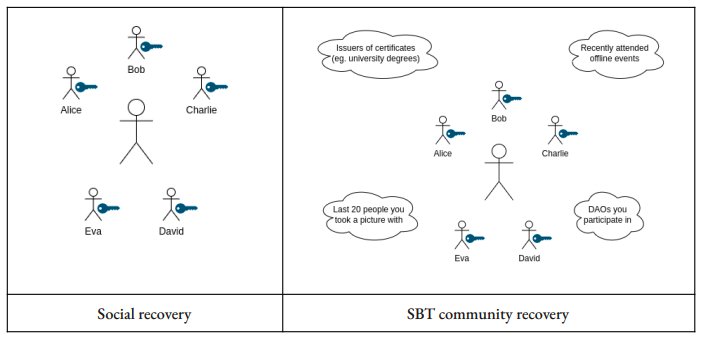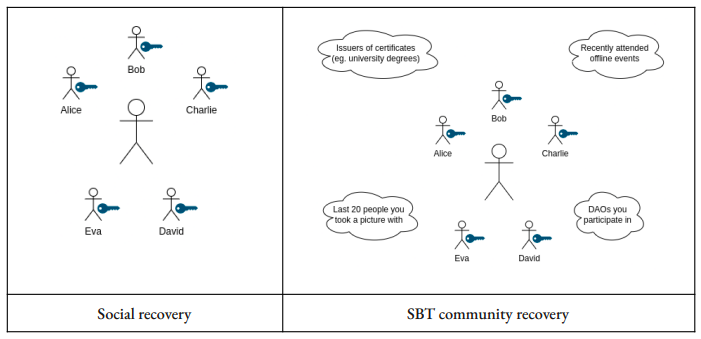Soulbound Tokens (SBTs): Meet The Tokens That May Change Your Life
Vitalik Buterin, best known as one of the co-founders of Ethereum, has a massive new Web3 project in the works. In a white paper entitled “Decentralized Society: Finding Web3’s Soul,” Buterin and his fellow authors detail their vision for a future decentralized society (DeSoc) that thrives on Soulbound Tokens (SBTs).
Here’s everything you need to know about the tokens that could change your life.
What are Soulbound Tokens (SBTs)?
Soulbound Tokens are NFTs that act like real-life achievement badges akin to what you’d get in a video game upon completing a certain task or clearing a milestone. But instead of receiving these badges for getting your character to max level, Buterin envisions them as a way to prove your employment history, education, and other IRL skills.
How do Soulbound Tokens work?
Soulbound Tokens are essentially your resume on the blockchain. Yes, anyone can say they went to Harvard by marking it as their alma mater on Facebook. But with SBTs, Harvard’s “Soul” (AKA, their wallet) would have to grant your “Soul” an SBT of a diploma for you to be able to make that claim.
SBTs can be distributed amongst members of a group or institution as proof of affiliation. Artists, writers, and creatives could use SBTs as digital portfolios. Even if it’s for something as niche as being the world’s leading expert on fingerboarding, your corresponding SBT would serve as a way of verifying those achievements to others.
This would make it next to impossible for people to claim false credentials. Buterin and his co-authors write, “the tokens could help solve some of the problems ravaging decentralized finance, like scams and theft.” This is where they believe the true power of the mechanism lies.
Unlike traditional NFTs, SBTs will be non-transferable, and therefore will not be able to be acquired via trade. However, users will be free to revoke their SBTs upon request.
What happens if you lose your Soul?
So what happens if your Soul wallet is hacked? Or if you lose the key to your Soul address? With thefts rampant within the NFT community, it’s vital to have proper safeguards or contingencies in place to prevent bad actors from taking identity theft to a whole new level.
Buterin has proposed community-wide adoption of the social recovery model to prevent SBT thieves. With social recovery, users can appoint a set of individuals or institutions as “guardians” who have the ability to access and change the private keys to their wallet should it get compromised. However, an individual would be hard-pressed to recover stolen SBTs if the people they appoint as guardians pass away or if their relationship breaks down.
By granting a wider community the ability to assist in the recovery process, Buterin believes that SBTs will be more easily retrievable upon theft. With this model, “recovering a Soul’s private keys would require a member from a qualified majority of a (random subset of) Soul’s communities to consent,” the authors write.

What will SBTs be used for?
In addition to representing our personal info and making it difficult for scammers to impersonate us, the tokens have other utilities. Because they’re non-transferable, they could be used for event ticketing, to create exclusive airdrops, AKA “Souldrops,” or even be used to track credit scores.
In some ways, this might sound intimidating — vaguely dystopian even, with some comparing SBTs to China’s idea of building a social credit system. The authors acknowledge this in the paper, writing that a database of SBTs could provide a marker to “automate red-lining of disfavored social groups or even target them for cyber or physical attack, enforce restrictive migration policies, or make predatory loans.”
This is one of the reasons why users can revoke their SBTs upon request, or even hide them from the public if needed.
But fret not, should SBTs get rolled out, the world won’t descend into the madness we saw on Nosedive, Black Mirror’s season 3 opener. Instead, SBTs are intended to function as safeguards against one of the biggest problems currently plaguing Web3 as a whole: scams.
Right now, especially in the NFT space, reputation plays a huge role in how much trust community members are willing to place in a project. We’ve seen this time and again, such as when the Azuki collection reached record-low floor prices upon revelations of its creator’s history in the space.
With SBTs, the Web3 community will be able to check for themselves if a project’s creator can be trusted, thus being able to make more informed decisions on which projects they would choose to support.
When will SBTs be available?
SBTs could be available by the end of 2022, according to Jason Levin, who interviewed the paper’s co-author, E. Glen Weyl.
Of course, this is only for “early uses,” – meaning there’s still a while before we see the DeSoc Buterin described in his paper. To get there, it’s going to be a communnity-wide effort.
The post Soulbound Tokens (SBTs): Meet The Tokens That May Change Your Life appeared first on nft now.

